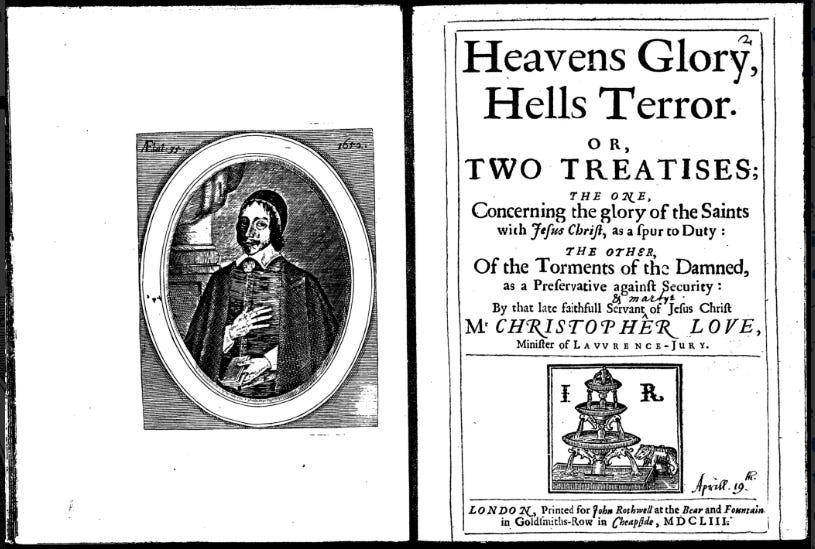Christian taboo
Why we need to talk about heaven and hell
I lie down with a world of comfort as if I were to lie down in my bed . . . where I shall rest in Abraham’s bosom and in the embraces of the Lord Jesus.
Those were among Christopher Love’s last words as he laid his head on the executioner’s block on the 22 August 1651. And the question I want to ask is what was it that enabled Love to say them?
I believe that the answer is found within the seventeen sermons that Love preached on heaven and hell. And in this series of posts I want to highlight some of the best bits to help you follow Jesus today.
Christian taboo
But before we get to the sermons themselves, it’s worth considering why we should think about these topics at all. Because my sense is that they don’t often get much of our attention.
This was illustrated to me when a pastor friend of mine described his experience on a recent sabbatical. During his three months away from his local church, he visited a dozen other evangelical congregations from a variety of denominations and groupings. And one thing that struck him was that during his visits the word hell wasn’t mentioned once. Heaven didn’t come up all that much either.
I don’t think my friend’s experience is unusual. Think of the songs we sing, and prayers we say. We might occasionally hear a sermon on heaven, but virtually never one on hell. And when it gets to the podcasts on our playlists or the books on our shelves, things aren’t any better. In fact, when I was making this point in a recent seminar at the South West Men’s Convention, I was standing in eye shot of the book stall. And, as I was speaking, I found myself wondering how many pages in all of the books for sale on those tables talked about hell. Would it even be one percent?

Reading Love’s sermons has made me realise that this should be a cause for concern. As five of his friends wrote in their preface,
Nothing has a greater influence on a Christian’s practice here in this world, than the serious consideration of our everlasting estate in the world to come.
They went on to explain how
It is the greatest folly in the world for men to be busied about many things which little concern them, and in the meantime neglect the one thing necessary: never thinking about the joys of heaven, and how they may attain unto them, or of the torments of hell, and how they may escape them.
For Love and his friends, thinking about heaven and hell was essential.
17th century déjà vu
At the beginning of his discussion of hell, Love acknowledged that, like now, it wasn’t a popular subject in his day. In fact, he only knew of one book written in English on the subject.
In an interesting insight into the religion of the mid-seventeenth century, Love commented that there were at least a couple of reasons why people didn’t talk about hell. Firstly, people objected to the preaching of hell because they did not regard it as the preaching of the gospel, but law. In response to this, Love made the point that Jesus - whom the gospel is about - was the person in the Bible who most spoke about hell. In other words, hell wasn’t unrelated to the gospel. No, it was the result of rejecting it, and so people had to know about it. That was what Jesus thought anyway.
Another reason Love thought people didn’t teach on hell was because they thought that other topics were better to preach about instead. They thought that subjects like Christ’s love were more successful in converting people and building up Christians. It is important to acknowledge that Love was not against preaching on more comforting subjects. After all, he devoted even more pages to his preaching on heaven than hell. Nevertheless, as he looked around the religious scene in mid-seventeenth-century England, he noticed that those who never spoke of hell were not as fruitful as those that did, whether that was in winning converts to Christ or in growing more like him. This was not to mention the Apostle Paul’s injunction to church leaders to preach ‘the whole counsel of God’ (Acts 20:17).
What about you?
Even before we get to what Love had to say about eternity, the fact that he made it such an important part of his theology has been instructive for me. Do heaven and hell form a significant part of my understanding of what God has done in Christ? Do I think of them when I meditate on the gospel? And what about when I talk about it with others?
Reflecting on these questions has helped me to see that I can be reluctant to press into eternal things. I might overlook them when they are in a Bible passage, or be slow to point towards them when they are a necessary consequence of what is being talked about in the text.
Moreover, when I do talk about heaven and hell, it is tempting to be vague. I can find myself moderating my language. Instead of using the language that the Bible does, I want to reach for more woolly concepts. If I am honest, this is less about explaining things in a way people can understand and more about pulling punches. Softening the Bible’s blow.
For Love and his group of pastor-friends, eternity had a central role in their understanding of the gospel. And that meant that to not preach heaven and hell was not only to be unfaithful in our presentation of it, but to deprive God’s people of what he had given them to help them keep following him.
Join me next time as we dive into what Love taught on these most important things.



Important (essential) topic to cover, that of eternity, by which I mean "new creation" more that "where do I go when I die". The Apostle Paul says that God's purpose was to bring all things in heaven and earth under Christ (Eph 1:10).
I personally would distance myself from 17th Century visions of hell... And I would not agree that Jesus said a lot about "hell" in the way it is understood in popular culture inside and outside the church.
He's an example of a more nuanced (biblical?) approach:
https://margmowczko.com/paul-james-jesus-hell-gehenna/
i hope these articles stimulate lots of healthy discussion and reflection (rather than "debate") because the implications of our conclusions have huge impact on our understanding of God, the Gospel, and our mission.
Whether we agree with Love's position on these matters or not, we have to understand that he held them dearly and they shaped his life. This should inspire us to act as if we truly believe what we say we believe.
Thx for getting this going James.